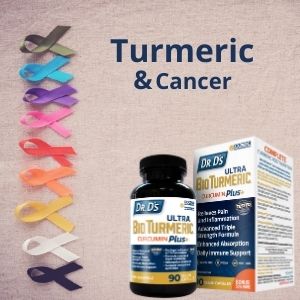
Cancer and Turmeric
Share
Cancer and Inflammation
Did you know that it is now estimated that 1 in 2 Canadians will develop cancer in their lifetime? Did you also know that there is now strong scientific evidence linking chronic inflammation to chronic disease, including cancer? What you also might be surprised to hear is that genetics actually play a small role and that a significant factor in most cancer development is actually a product of our modern lifestyle.
Let’s discuss inflammation so that I can better explain its association to cancer. Inflammation is the immune system’s normal response to injury, toxins or infection. This short-term, or acute, inflammation is beneficial when it is under control, however, when it persists longer than necessary it is known as chronic inflammation. But let’s take a step back. I understand that at this point you may be wondering, “How can cancer be a consequence of both lifestyle choice and chronic inflammation?” This is a great question. Allow me to explain.
What we are exposed to in our modern society and our lifestyle choices such as smoking, a high intake of processed foods, high stress, and environmental pollutants actually increase the systemic inflammation in our bodies as those are all sources of toxins that our immune system continually tries to fight off. This chronic, persistent inflammation causes tissue destruction and scarring, reshaping of healthy or normal tissue, and changes in gene expression. All of these unnecessary changes cause cells to undergo transformation and rapid growth. This abnormal and uncontrolled proliferation of maladaptive or inappropriate cells in a tissue (known as dysplasia) is a classic precursor to cancer!
Cancer and Turmeric
Turmeric is well known for its powerful anti-inflammatory properties. In fact, cancer rates are lowest in countries that have the highest dietary intake of turmeric among the population. For example, the prevalence of some of the most common cancers (lung, breast, prostate and colon) are as much as 10 times lower in India (where there is a high turmeric dietary intake) than in the US, where there is a relatively low turmeric dietary intake among the population and a widespread pro-inflammatory lifestyle.
A thorough 2019 review of the literature concluded that curcumin, either alone or combined with other agents, may actually be an effective drug for cancer therapy. How can that be? There are many proposed mechanisms for curcumin’s protective action against cancer.
For example, turmeric prevents the unhealthy inflammatory cascade mentioned above and may therefore cease tumor formation, meaning that it stops the transformation from a healthy cell into a cancer cell. A classic example of this is in the case of HPV and cervical cancer. It is commonly accepted that some strains of HPV cause cervical cancer by instigating abnormal changes to normal cervical cells. Turmeric has been found to prevent precancerous changes in cervical cells after being infected by HPV. Turmeric also inhibits the activation of cancer-causing genes. It has also been shown to inhibit the proliferation (or spread) of cancer cells. It can also prevent the polyps, or growths, that lead to cancer. For example, turmeric has been found to delay the onset of colon cancer by preventing the formation of polyps on the intestinal lining of people living with familial adenomatous polyposis, a genetic condition that causes the extra tissue growth that precedes colon cancer. Turmeric also blocks angiogenesis (the formation of new blood vessels) to a tumor, thereby cutting off its nutrient supply and suffocating tumor growth. Lastly, turmeric has been shown to help in the efficacy of chemotherapy and to reduce side effects for patients undergoing treatment for breast, thyroid, liver, lung, prostate and skin cancers.
Evidence points strongly towards turmeric’s benefits in terms of slowing down, delaying or preventing cancer cells from forming in the first place. Therefore, it is important to speak about turmeric and cancer in the context of prevention. A full-spectrum turmeric supplement should be considered as a daily part of a healthy lifestyle to give your body the best chance at combating future disease such as cancer.